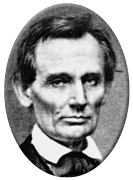
Every year since 1988 the Lincoln Group of New York has presented its prestigious and nationally-recognized Award of Achievement to an individual or organization for their contribution to Lincoln studies, the presentation of which is traditionally made at our February meeting.
The list of recipients is a veritable Who’s Who of Lincoln scholars, including such individuals as Harold Holzer, Eric Foner, Mark E. Neely, Jr., Ronald C. White, Jr., Gabor Boritt, Doris Kearns Goodwin, David Herbert Donald, William Lee Miller, Edward Steers, Jr., and Garry Wills.
The award has also been presented to such organizations as The Glass Entertainment Group for its production of the CNN series Lincoln: Divided We Stand; The Abraham Lincoln Presidential Museum in Springfield, Illinois; and Ford’s Theatre in Washington, DC, for its presentation of a variety of programs and exhibits titled Ford’s 150: Remembering the Lincoln Assassination.

2022
And There Was Light: Abraham Lincoln and the American Struggle
by Jon Meacham
This deeply researched chronicle of Lincoln’s life covers his birth and youth in Kentucky and Indiana; his young adulthood, self-education, marriage, and legal and political careers in Illinois; and finally his presidency during the most trying period of the country’s existence.
In the process, it presents Lincoln as both a practical politician and a man of enormous faith who believed God takes a hand in the day-to-day lives of people and always strove to do the right as God gave him “to see the right.” And There Was Light was also co-winner of the Gilder Lehrman Lincoln Prize.
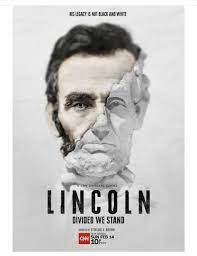
2021
Lincoln: Divided We Stand / CNN Series – Aired February 14 – March 21, 2021
Produced by The Glass Entertainment Group: executive produced by Nancy Glass and Jon Hirsch and directed by Jon Hirsch
The first television production ever chosen for the award, this miniseries covered Lincoln’s life, including his legacy, in six hour-long episodes titled “Rising Star,” “Portrait of a Leader,” “A Country on Edge,” “A Proclamation,” “The Dogs of War,” and “Hope, Tragedy, and the New Normal.” Through a mixture of cinematic recreations, rare artifacts, never before broadcast photos and letters, and interviews with nearly two dozen prominent Lincoln scholars, the series portrays the sixteenth president not as a paragon but as the extraordinarily complex human being he was.
Past Winners
2020
Lincoln on the Verge: Thirteen Days to Washington by Ted Widmer
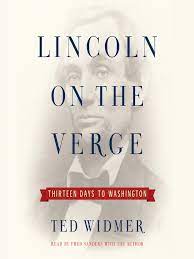 Telling the story of Lincoln’s exhausting, thirteen-day train trip from Springfield to Washington, DC in February 1861, the book provides readers with an extraordinary sense of immediacy enabling them to feel what it must have been like to travel with Lincoln’s entourage, as well as putting the trip into a broader historical context. It also shows how the journey enabled the president-elect to discover an inner strength as he prepared to deal with, as he put it, “a task…greater than that which rested upon Washington.”
Telling the story of Lincoln’s exhausting, thirteen-day train trip from Springfield to Washington, DC in February 1861, the book provides readers with an extraordinary sense of immediacy enabling them to feel what it must have been like to travel with Lincoln’s entourage, as well as putting the trip into a broader historical context. It also shows how the journey enabled the president-elect to discover an inner strength as he prepared to deal with, as he put it, “a task…greater than that which rested upon Washington.”
2019
The Black Heavens: Abraham Lincoln and Death by Brian R. Dirck
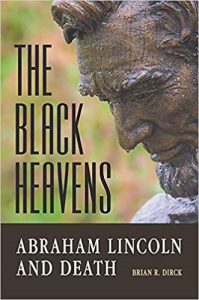 This first in-depth analysis of Lincoln’s encounters with death begins with the familiar stories of the deaths of those closest to him, placing them in the context of his overall experience, the prevalence and progression of disease during the nineteenth century, and contemporary conventions regarding death. Then, turning to the carnage of the Civil War, it extrapolates from Lincoln’s words and actions the evolution of his understanding of the meaning of death in political, personal, and, most importantly, spiritual terms.
This first in-depth analysis of Lincoln’s encounters with death begins with the familiar stories of the deaths of those closest to him, placing them in the context of his overall experience, the prevalence and progression of disease during the nineteenth century, and contemporary conventions regarding death. Then, turning to the carnage of the Civil War, it extrapolates from Lincoln’s words and actions the evolution of his understanding of the meaning of death in political, personal, and, most importantly, spiritual terms.
2018
Becoming Lincoln by William W. Freehling
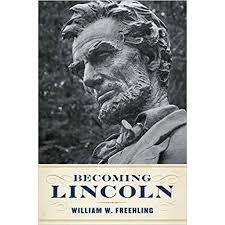 Focusing on the prewar years and arguing that Lincoln’s “monumental life was all about becoming,” Becoming Lincoln demonstrates that Lincoln’s story is striking on two counts: first, because he “specialized in turning losses into gains,” learning from his many failures and applying what he learned throughout his life; and second, because of the uncanny ways in which, although considered to be a self-made man, he was always able to attract the assistance of others that ultimately enabled him to succeed.
Focusing on the prewar years and arguing that Lincoln’s “monumental life was all about becoming,” Becoming Lincoln demonstrates that Lincoln’s story is striking on two counts: first, because he “specialized in turning losses into gains,” learning from his many failures and applying what he learned throughout his life; and second, because of the uncanny ways in which, although considered to be a self-made man, he was always able to attract the assistance of others that ultimately enabled him to succeed.
2017
Wrestling with His Angel: The Political Life of Abraham Lincoln, Vol. II, 1849-1856 by Sidney Blumenthal
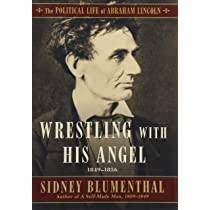 The second book of a projected five-volume biography, The Political Life of Abraham Lincoln, this volume shows how Lincoln, his political career apparently over in 1849, re-entered that realm and began to work behind the scenes to help form the new Republican Party. In the process it describes a complex web of personalities, political forces, and personal and historic events that shaped his character and prepared him for the national stage.
The second book of a projected five-volume biography, The Political Life of Abraham Lincoln, this volume shows how Lincoln, his political career apparently over in 1849, re-entered that realm and began to work behind the scenes to help form the new Republican Party. In the process it describes a complex web of personalities, political forces, and personal and historic events that shaped his character and prepared him for the national stage.
2016
Lincoln’s Greatest Journey: Sixteen Days that Changed a Presidency, March 24 – April 8, 1865 by Noah Andre Trudeau
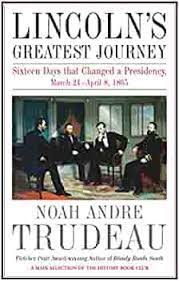 By March 1865 the Civil War was nearly over, and Abraham Lincoln was exhausted by the efforts required to sustain the Union. General U.S. Grant’s invitation to visit him at City Point, Virginia, provided the beleaguered president with a much-needed opportunity to escape Washington and its demands. This extensively researched and detailed discussion of that journey, the most comprehensive to date, shows how it enabled him, as the author says, to “reset his internal compass to begin to lead the country out of the storm.”
By March 1865 the Civil War was nearly over, and Abraham Lincoln was exhausted by the efforts required to sustain the Union. General U.S. Grant’s invitation to visit him at City Point, Virginia, provided the beleaguered president with a much-needed opportunity to escape Washington and its demands. This extensively researched and detailed discussion of that journey, the most comprehensive to date, shows how it enabled him, as the author says, to “reset his internal compass to begin to lead the country out of the storm.”
2015 Co-Winner
Ford’s Theatre for Ford’s 150: Remembering the Lincoln Assassination
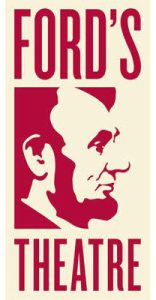 Under the auspices of the National Park Service, and with support from several corporate sponsors, between January and May 2015 Ford’s Theatre presented a wide-ranging series of programs, events, and exhibits in remembrance of the 150th anniversary of the assassination of Abraham Lincoln. It included theatrical productions, commemorative ceremonies, panel discussions, tours of the theatre, an overnight candlelight vigil on April 14 and 15, walking tours, and other events. The combined activities of Ford’s 150, which were attended by more than 4,000 people, were the first such endeavors to receive the LGNY’s Award of Achievement.
Under the auspices of the National Park Service, and with support from several corporate sponsors, between January and May 2015 Ford’s Theatre presented a wide-ranging series of programs, events, and exhibits in remembrance of the 150th anniversary of the assassination of Abraham Lincoln. It included theatrical productions, commemorative ceremonies, panel discussions, tours of the theatre, an overnight candlelight vigil on April 14 and 15, walking tours, and other events. The combined activities of Ford’s 150, which were attended by more than 4,000 people, were the first such endeavors to receive the LGNY’s Award of Achievement.
2015 Co-Winner
Lincoln and the Jews by Jonathan D. Sarna and Benjamin Shapell
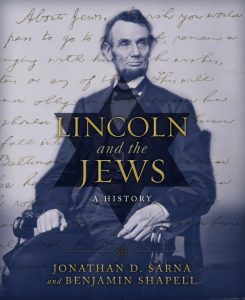 The result of extensive research, this visually stunning book, the companion volume to an exhibit at the New-York Historical Society, is the first to detail Abraham Lincoln’s relationship with American Jews. As such, it documents his long history of befriending Jews, recruiting Jewish advisors, promoting Jewish equality, and appointing numerous Jews to public office, in the process providing a definitive study of a previously unexplored area of Lincoln scholarship.
The result of extensive research, this visually stunning book, the companion volume to an exhibit at the New-York Historical Society, is the first to detail Abraham Lincoln’s relationship with American Jews. As such, it documents his long history of befriending Jews, recruiting Jewish advisors, promoting Jewish equality, and appointing numerous Jews to public office, in the process providing a definitive study of a previously unexplored area of Lincoln scholarship.
2014
Lincoln and the Power of the Press: The War for Public Opinion by Harold Holzer
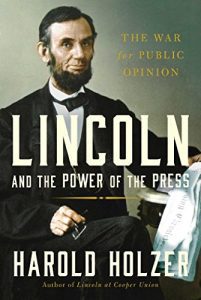 From the beginning of Lincoln’s political career he was conscious of the importance of public sentiment and the role of the press in influencing it. This book demonstrates that whether it was by manipulating the three most powerful publishers of the time—Horace Greeley, James Gordon Bennett, and Henry Raymond—or, when he felt it was necessary, closing down papers he considered to be “disloyal,” Lincoln was a man who appreciated, understood, and used the press to speak directly to the people and to advance his political goals. Lincoln and the Power of the Press was also awarded the Gilder Lehrman Lincoln Prize.
From the beginning of Lincoln’s political career he was conscious of the importance of public sentiment and the role of the press in influencing it. This book demonstrates that whether it was by manipulating the three most powerful publishers of the time—Horace Greeley, James Gordon Bennett, and Henry Raymond—or, when he felt it was necessary, closing down papers he considered to be “disloyal,” Lincoln was a man who appreciated, understood, and used the press to speak directly to the people and to advance his political goals. Lincoln and the Power of the Press was also awarded the Gilder Lehrman Lincoln Prize.
2013
Rise to Greatness: Abraham Lincoln and America’s Most Perilous Year by David Von Drehle
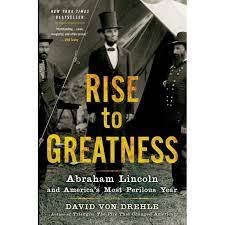
At the start of 1862 the Confederacy appeared to have the upper hand both economically and militarily, and the United States’ situation seemed dire. But by the end of the year the tide had begun to turn. Competent Union generals had begun to emerge, the Confederate army had suffered some key losses, and the Union’s industrial and financial strength had begun to coalesce. Rise to Greatness shows how Lincoln overcame the challenges he had to face in order to keep the country on a steady course during the most severe crisis in its history.
2012
Lincoln directed by Steven Spielberg
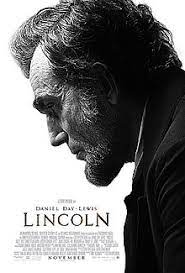 The first film ever chosen for the LGNY Award of Achievement, Lincoln was based partly on Doris Kearns Goodwin’s Team of Rivals: The Political Genius of Abraham Lincoln, which won the award in 2006. Starring Daniel Day-Lewis and Sally Field, the film covers the last four months of Lincoln’s life and focuses on his efforts to have the Thirteenth Amendment to the Constitution, already approved by the U.S. Senate, approved by the House of Representatives. Enormously popular with the public, and acclaimed by the critics, it was nominated for seven Golden Globe Awards and twelve Academy Awards, including Best Picture, Best Director, and Best Actor. Mr. Day-Lewis won both the Golden Globe and Academy Awards for Best Actor.
The first film ever chosen for the LGNY Award of Achievement, Lincoln was based partly on Doris Kearns Goodwin’s Team of Rivals: The Political Genius of Abraham Lincoln, which won the award in 2006. Starring Daniel Day-Lewis and Sally Field, the film covers the last four months of Lincoln’s life and focuses on his efforts to have the Thirteenth Amendment to the Constitution, already approved by the U.S. Senate, approved by the House of Representatives. Enormously popular with the public, and acclaimed by the critics, it was nominated for seven Golden Globe Awards and twelve Academy Awards, including Best Picture, Best Director, and Best Actor. Mr. Day-Lewis won both the Golden Globe and Academy Awards for Best Actor.
2011
Lincoln and the Triumph of the Nation: Constitutional Conflict in the American Civil War by Mark E. Neely, Jr.
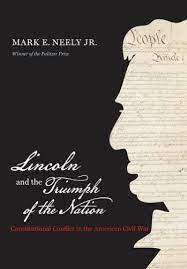 The Civil War placed the greatest strain on the U.S. Constitution it had ever had. This book is the first to examine how that Constitution, as well as the Constitution of the Confederacy, much of it derived from the U.S. Constitution, impacted on the struggle for national existence, both North and South. Based on judicial opinions, presidential papers, political pamphlets, and the press, the book shows how Union and Confederate judges, lawyers, politicians, and others made use of their constitutions in order to wage the war and to save, or create, their nation. Dr. Neely previously won the LGNY Award of Achievement in 1991 for his book The Fate of Liberty: Abraham Lincoln and Civil Liberties.
The Civil War placed the greatest strain on the U.S. Constitution it had ever had. This book is the first to examine how that Constitution, as well as the Constitution of the Confederacy, much of it derived from the U.S. Constitution, impacted on the struggle for national existence, both North and South. Based on judicial opinions, presidential papers, political pamphlets, and the press, the book shows how Union and Confederate judges, lawyers, politicians, and others made use of their constitutions in order to wage the war and to save, or create, their nation. Dr. Neely previously won the LGNY Award of Achievement in 1991 for his book The Fate of Liberty: Abraham Lincoln and Civil Liberties.
2010
The Fiery Trial: Abraham Lincoln and American Slavery by Eric Foner
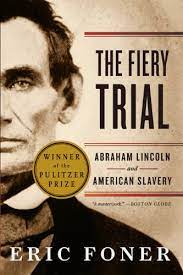 Starting with Lincoln’s youth in Indiana and Illinois, and aiming to “take Lincoln whole, incorporating his strengths and shortcomings, his insights and misjudgments,” The Fiery Trial follows his career from that of a small town politician to president of the United States. In the process it provides a picture of a “naturally anti-slavery” man successfully weathering the storm over slavery’s extension, embracing the cause of abolition, and, as a commander-in-chief in wartime, applying a combination of pragmatism and principle that enabled him to hold the country together and led to the final destruction of slavery. The Fiery Trial was also awarded the Pulitzer Prize in History, the Bancroft Prize, and the Gilder Lehrman Lincoln Prize.
Starting with Lincoln’s youth in Indiana and Illinois, and aiming to “take Lincoln whole, incorporating his strengths and shortcomings, his insights and misjudgments,” The Fiery Trial follows his career from that of a small town politician to president of the United States. In the process it provides a picture of a “naturally anti-slavery” man successfully weathering the storm over slavery’s extension, embracing the cause of abolition, and, as a commander-in-chief in wartime, applying a combination of pragmatism and principle that enabled him to hold the country together and led to the final destruction of slavery. The Fiery Trial was also awarded the Pulitzer Prize in History, the Bancroft Prize, and the Gilder Lehrman Lincoln Prize.
2009
A. Lincoln: A Biography by Ronald C. White, Jr.
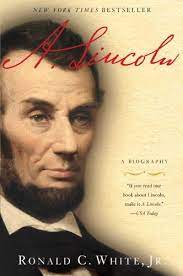 Portraying our sixteenth president primarily as a man of integrity, A. Lincoln presents a full and well-rounded picture of Lincoln’s personal, political, and moral evolution. As such, it not only covers Lincoln’s life from his birth to his death at the hands of an assassin, it also demonstrates how he used language as a political and diplomatic tool, exhibits his ability to “think anew and act anew,” and shows how his evolving religious views shaped the course of his life, and the nation’s.
Portraying our sixteenth president primarily as a man of integrity, A. Lincoln presents a full and well-rounded picture of Lincoln’s personal, political, and moral evolution. As such, it not only covers Lincoln’s life from his birth to his death at the hands of an assassin, it also demonstrates how he used language as a political and diplomatic tool, exhibits his ability to “think anew and act anew,” and shows how his evolving religious views shaped the course of his life, and the nation’s.
2008
Lincoln President-Elect: Abraham Lincoln and the Great Secession Winter 1860-1861 by Harold Holzer
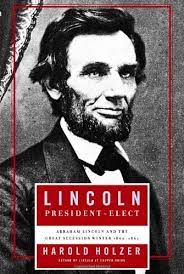 Covering the four months between Lincoln’s election and his inauguration, this book shows how, despite the conventional wisdom that he had mishandled what Henry Adams called the “Great Secession Winter of 1860-1861,” during that period Lincoln actually waged a campaign to prevent the extension of slavery and tried, though unsuccessfully, to limit secession in the south. Having determined that he would not compromise on slavery or secession, the book argues, Lincoln used public statements, private correspondence, political pressure, and personal persuasion to ultimately guarantee the integrity of the Union even while making inevitable the war that nearly tore it apart.
Covering the four months between Lincoln’s election and his inauguration, this book shows how, despite the conventional wisdom that he had mishandled what Henry Adams called the “Great Secession Winter of 1860-1861,” during that period Lincoln actually waged a campaign to prevent the extension of slavery and tried, though unsuccessfully, to limit secession in the south. Having determined that he would not compromise on slavery or secession, the book argues, Lincoln used public statements, private correspondence, political pressure, and personal persuasion to ultimately guarantee the integrity of the Union even while making inevitable the war that nearly tore it apart.
2007
The Gettysburg Gospel: The Lincoln Speech That Nobody Knows by Gabor S. Boritt
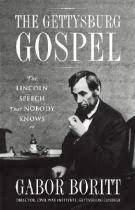 Based on years of scholarship, The Gettysburg Gospel examines the conflicting stories about the origins and meaning of Lincoln’s iconic address. Beginning with a discussion of the devastating effect of the battle on the small town of Gettysburg, Pennsylvania, the book reconstructs what really happened at the cemetery’s dedication on November 19, 1863, provides a careful analysis of the words of the Address itself, and clarifies from which of the several extant handwritten texts Lincoln actually read. In the process, it tears away the myths, lies, and legends about the Address, and enables readers to better understand what many consider to be the greatest speech in American history.
Based on years of scholarship, The Gettysburg Gospel examines the conflicting stories about the origins and meaning of Lincoln’s iconic address. Beginning with a discussion of the devastating effect of the battle on the small town of Gettysburg, Pennsylvania, the book reconstructs what really happened at the cemetery’s dedication on November 19, 1863, provides a careful analysis of the words of the Address itself, and clarifies from which of the several extant handwritten texts Lincoln actually read. In the process, it tears away the myths, lies, and legends about the Address, and enables readers to better understand what many consider to be the greatest speech in American history.
2006
Team of Rivals: The Political Genius of Abraham Lincoln by Doris Kearns Goodwin
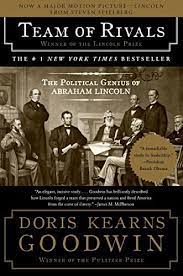 Although Abraham Lincoln was elected president in 1860, there were three other Republicans, better known and more widely respected—William H. Seward, Salmon P. Chase, and Edward Bates—who firmly believed they were more deserving of the office. Team of Rivals, essentially a multiple biography, shows how the winner unprecedently brought these disgruntled former opponents into his cabinet—as secretary of state, secretary of the treasury, and attorney general, and during a tumultuous period in American history managed to win their respect (and friendship in the case of Seward), and harness their abilities to help win the war and preserve the Union. Team of Rivals also won the Gilder Lehrman Lincoln Prize.
Although Abraham Lincoln was elected president in 1860, there were three other Republicans, better known and more widely respected—William H. Seward, Salmon P. Chase, and Edward Bates—who firmly believed they were more deserving of the office. Team of Rivals, essentially a multiple biography, shows how the winner unprecedently brought these disgruntled former opponents into his cabinet—as secretary of state, secretary of the treasury, and attorney general, and during a tumultuous period in American history managed to win their respect (and friendship in the case of Seward), and harness their abilities to help win the war and preserve the Union. Team of Rivals also won the Gilder Lehrman Lincoln Prize.
2005
Abraham Lincoln Presidential Museum, Springfield, Illinois
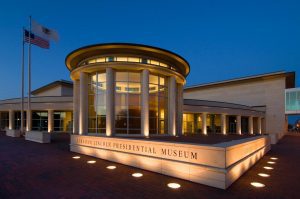 Designed as the first “experience museum,” the ALPM is a unique combination of scholarship and showmanship. Its exhibits, presented as a “Journey” divided into two parts—The Pre-Presidential Years and The White House Years—were developed by a large team of historians and other advisors, including some of the world’s leading authorities on the life of Abraham Lincoln, who in turn drew on more than forty other organizations for guidance. Borrowing techniques from Hollywood, Broadway, and theme parks, the museum was built using state-of-the-art technologies that, together, provide visitors with an immersive experience that is educational, entertaining, and inspiring.
Designed as the first “experience museum,” the ALPM is a unique combination of scholarship and showmanship. Its exhibits, presented as a “Journey” divided into two parts—The Pre-Presidential Years and The White House Years—were developed by a large team of historians and other advisors, including some of the world’s leading authorities on the life of Abraham Lincoln, who in turn drew on more than forty other organizations for guidance. Borrowing techniques from Hollywood, Broadway, and theme parks, the museum was built using state-of-the-art technologies that, together, provide visitors with an immersive experience that is educational, entertaining, and inspiring.
2004
Lincoln at Cooper Union: The Speech That Made Abraham Lincoln President by Harold Holzer
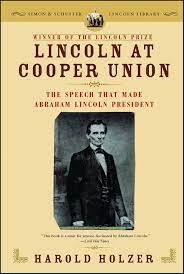 An unprecedented third LGNY Award of Achievement was presented to Harold Holzer for this definitive account of the influential and widely-reported address Lincoln delivered at Cooper Union in New York City in February 1860, which many consider a major—if not the major—step toward his nomination for president. The book shows why, based on careful research by the soon-to-be candidate, the speech was such an extraordinarily convincing anti-slavery lecture arguing, as it did, that the majority of the Founders, and the authors of the Constitution, expected and intended that slavery would eventually disappear in America. It also shows how, combined with Lincoln’s subsequent public relations campaign, it helped convinced voters across the country that he was an eminently suitable candidate for the presidency.
An unprecedented third LGNY Award of Achievement was presented to Harold Holzer for this definitive account of the influential and widely-reported address Lincoln delivered at Cooper Union in New York City in February 1860, which many consider a major—if not the major—step toward his nomination for president. The book shows why, based on careful research by the soon-to-be candidate, the speech was such an extraordinarily convincing anti-slavery lecture arguing, as it did, that the majority of the Founders, and the authors of the Constitution, expected and intended that slavery would eventually disappear in America. It also shows how, combined with Lincoln’s subsequent public relations campaign, it helped convinced voters across the country that he was an eminently suitable candidate for the presidency.
2003
We Are Lincoln Men: Abraham Lincoln and His Friends by David Herbert Donald
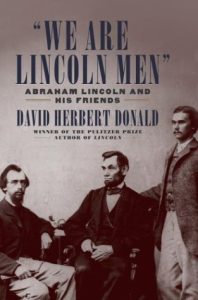 As might be expected of a politician, Abraham Lincoln referred to many people as “friends.” However, using Aristotle’s definition of “perfect” or “complete” friendships, We Are Lincoln Men argues that there were only six men who fit that description in regard to Lincoln: Joshua F. Speed, William H. Herndon, Orville H. Browning, William H. Seward, John Hay, and John G. Nicolay. It accordingly examines those relationships and discusses their significance in Lincoln’s life, particularly the importance they had in his career and his presidency. Mr. Donald previously won the LGNY Award of Achievement in 1995 for Lincoln.
As might be expected of a politician, Abraham Lincoln referred to many people as “friends.” However, using Aristotle’s definition of “perfect” or “complete” friendships, We Are Lincoln Men argues that there were only six men who fit that description in regard to Lincoln: Joshua F. Speed, William H. Herndon, Orville H. Browning, William H. Seward, John Hay, and John G. Nicolay. It accordingly examines those relationships and discusses their significance in Lincoln’s life, particularly the importance they had in his career and his presidency. Mr. Donald previously won the LGNY Award of Achievement in 1995 for Lincoln.
2002
Lincoln’s Virtues: An Ethical Biography by William Lee Miller
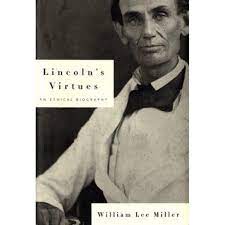 Abraham Lincoln, this book argues, was a great man who was also a good man. The primary purpose of this “ethical biography” is to demonstrate how he became both by charting his moral and intellectual development, particularly in regard to the major issues of his day, most importantly that of slavery. Chronicling his life roughly from young manhood to his first inaugural address, the book demonstrates how Lincoln shaped himself as a writer, speaker, moral agent, and statesman, and, by reviewing the moments of “moral escalation” in his political life, how he ultimately became the man he was.
Abraham Lincoln, this book argues, was a great man who was also a good man. The primary purpose of this “ethical biography” is to demonstrate how he became both by charting his moral and intellectual development, particularly in regard to the major issues of his day, most importantly that of slavery. Chronicling his life roughly from young manhood to his first inaugural address, the book demonstrates how Lincoln shaped himself as a writer, speaker, moral agent, and statesman, and, by reviewing the moments of “moral escalation” in his political life, how he ultimately became the man he was.
2001
Blood on the Moon: The Assassination of Abraham Lincoln by Dr. Edward Steers, Jr.
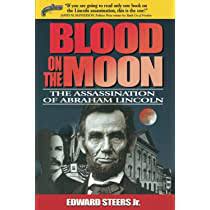 Blood on the Moon argues that there has been no comprehensive study to date of Lincoln’s assassination and Booth’s escape based on primary sources, and that much of what has been written about those events is incorrect. Drawing primarily on the official government records of the Office of the Judge Advocate General and the Ben: Perley Poore version of the conspiracy trial transcripts, as well as other reliable sources, the book debunks the many myths about the assassination and provides the first accurate description of what occurred in the days prior to and immediately following Lincoln’s murder.
Blood on the Moon argues that there has been no comprehensive study to date of Lincoln’s assassination and Booth’s escape based on primary sources, and that much of what has been written about those events is incorrect. Drawing primarily on the official government records of the Office of the Judge Advocate General and the Ben: Perley Poore version of the conspiracy trial transcripts, as well as other reliable sources, the book debunks the many myths about the assassination and provides the first accurate description of what occurred in the days prior to and immediately following Lincoln’s murder.
2000
Abraham Lincoln and the Forge of National Memory by Barry Schwartz
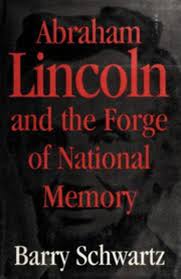 Although Abraham Lincoln has long been considered one of the greatest, if not the greatest, American president, he was in his own time a controversial politician who almost lost his bid for reelection for a second term. This book is essentially an examination of the changes that took place in his reputation from the time of his death through the late nineteenth and early twentieth centuries, and ultimately to his apotheosis during the Progressive Era and World War I. To do so, it draws on a variety of examples of popular culture—including painting and sculpture, magazines, textbooks, newspapers, and other sources—to show how the change in Americans’ image of him was the result of transformations that took place in society.
Although Abraham Lincoln has long been considered one of the greatest, if not the greatest, American president, he was in his own time a controversial politician who almost lost his bid for reelection for a second term. This book is essentially an examination of the changes that took place in his reputation from the time of his death through the late nineteenth and early twentieth centuries, and ultimately to his apotheosis during the Progressive Era and World War I. To do so, it draws on a variety of examples of popular culture—including painting and sculpture, magazines, textbooks, newspapers, and other sources—to show how the change in Americans’ image of him was the result of transformations that took place in society.
1999
1863: The Rebirth of a Nation by Joseph E. Stevens
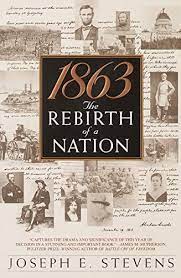 As the first book to focus on the year of the Civil War in which the tide conclusively began to turn from the Confederacy to the Union, 1863 presents all the major events of the year from the signing of the Emancipation Proclamation in January to the Battle of Gettysburg and the Siege of Vicksburg in July, to the completion of the long-unfinished Capitol dome in December. It wasn’t, though, merely a year of military transformation but also one of enormous political, economic, and social changes, all of which are shown through stories of political leaders and military commanders, avaricious young capitalists, and the emerging giants of American literature.
As the first book to focus on the year of the Civil War in which the tide conclusively began to turn from the Confederacy to the Union, 1863 presents all the major events of the year from the signing of the Emancipation Proclamation in January to the Battle of Gettysburg and the Siege of Vicksburg in July, to the completion of the long-unfinished Capitol dome in December. It wasn’t, though, merely a year of military transformation but also one of enormous political, economic, and social changes, all of which are shown through stories of political leaders and military commanders, avaricious young capitalists, and the emerging giants of American literature.
1998
Honor’s Voice: The Transformation of Abraham Lincoln by Douglas L. Wilson
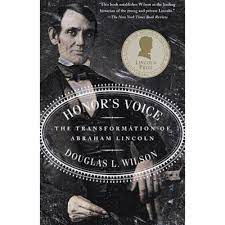 Drawing heavily on the spoken words and writings of Lincoln’s contemporaries, Honor’s Voice chronicles the changes Abraham Lincoln experienced as he went from a boy intent on making something of himself to a young man best known for his talents at wrestling and storytelling. Then, focusing on the years between 1831 and 1842, it provides a picture of an ambitious young politician determined to succeed despite the emotional difficulties—including bouts of depression and problematic relationships with women—that on at least two occasions threatened to overcome him. Honor’s Voice also won the Gilder Lehrman Lincoln Prize
Drawing heavily on the spoken words and writings of Lincoln’s contemporaries, Honor’s Voice chronicles the changes Abraham Lincoln experienced as he went from a boy intent on making something of himself to a young man best known for his talents at wrestling and storytelling. Then, focusing on the years between 1831 and 1842, it provides a picture of an ambitious young politician determined to succeed despite the emotional difficulties—including bouts of depression and problematic relationships with women—that on at least two occasions threatened to overcome him. Honor’s Voice also won the Gilder Lehrman Lincoln Prize
1997
The Lincoln Forum—Frank J. Williams, Chair
 In early 1996, Frank J. Williams, Harold Holzer, Dr. David Long, Charles Platt, and Maynard Schrock joined together to found a new, East Coast-based Lincoln organization that would bring people from all over the country to a multi-day symposium where they could hear the country’s leading Lincoln experts and share a family-like atmosphere of camaraderie with other Lincoln devotees. Intended to be the first of such symposiums, it was held in Gettysburg, Pennsylvania, from November 16th to 18th, just before the annual commemoration of the Gettysburg Address, and provided its 100 attendees with the opportunity to hear speakers Richard Nelson Current, John Y. Simon, Daniel Weinberg, James Kushlan, Mr. Williams, and Mr. Holzer, and was a resounding success.
In early 1996, Frank J. Williams, Harold Holzer, Dr. David Long, Charles Platt, and Maynard Schrock joined together to found a new, East Coast-based Lincoln organization that would bring people from all over the country to a multi-day symposium where they could hear the country’s leading Lincoln experts and share a family-like atmosphere of camaraderie with other Lincoln devotees. Intended to be the first of such symposiums, it was held in Gettysburg, Pennsylvania, from November 16th to 18th, just before the annual commemoration of the Gettysburg Address, and provided its 100 attendees with the opportunity to hear speakers Richard Nelson Current, John Y. Simon, Daniel Weinberg, James Kushlan, Mr. Williams, and Mr. Holzer, and was a resounding success.
1996
Recollected Words of Abraham Lincoln edited by Don E. and Virginia Fehrenbacher
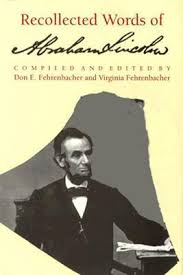 Much of what is known—or believed—about Abraham Lincoln comes from statements recalled by hundreds of his contemporaries over a period of fifty years. These recollected words fall outside the Lincoln canon as they are not part of his collected works, but they have had a considerable effect on how Lincoln is perceived by history. Based on extensive research into diaries, letters, newspaper interviews, and other types of recollective writings, this book is a comprehensive collection of remarks attributed to Lincoln by his contemporaries, arranged alphabetically according to the individual who reported them and, invaluably, rated on their reliability by the editors. Mr. Fehrenbacher previously won the LGNY award in 1989 for his two-volume collection of Lincoln’s speeches and writings.
Much of what is known—or believed—about Abraham Lincoln comes from statements recalled by hundreds of his contemporaries over a period of fifty years. These recollected words fall outside the Lincoln canon as they are not part of his collected works, but they have had a considerable effect on how Lincoln is perceived by history. Based on extensive research into diaries, letters, newspaper interviews, and other types of recollective writings, this book is a comprehensive collection of remarks attributed to Lincoln by his contemporaries, arranged alphabetically according to the individual who reported them and, invaluably, rated on their reliability by the editors. Mr. Fehrenbacher previously won the LGNY award in 1989 for his two-volume collection of Lincoln’s speeches and writings.
1995
Lincoln by David Herbert Donald
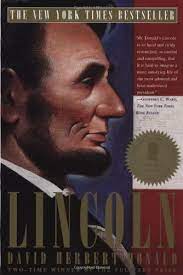 Drawing more extensively than any earlier works on our sixteenth president’s personal papers, those of his contemporaries, and newly discovered records of his legal practice, Lincoln presents an in-depth picture of his rise from humble origins to important positions in the legal and political world of Springfield, Illinois, and ultimately to the pinnacle of American politics. It also explains how Lincoln’s capacity for growth enabled him to weather the storm of the Civil War, demonstrates the development of his character, and shows the importance of his private life in shaping his public career. Lincoln also received the Gilder Lehrman Lincoln Prize.
Drawing more extensively than any earlier works on our sixteenth president’s personal papers, those of his contemporaries, and newly discovered records of his legal practice, Lincoln presents an in-depth picture of his rise from humble origins to important positions in the legal and political world of Springfield, Illinois, and ultimately to the pinnacle of American politics. It also explains how Lincoln’s capacity for growth enabled him to weather the storm of the Civil War, demonstrates the development of his character, and shows the importance of his private life in shaping his public career. Lincoln also received the Gilder Lehrman Lincoln Prize.
1994
The Huntington Library Lincoln Exhibit: “The Last Best Hope of Earth: Abraham Lincoln and the Promise of America,” October 1993 to August 1994
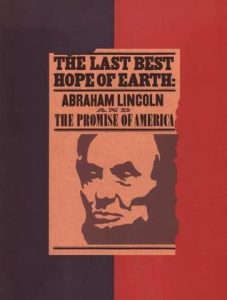 Curated by Thomas F. Schwartz and John H. Rhodehamel, this exhibit drew on the Lincolniana of the Illinois State Historical Library’s Henry Horner Lincoln Collection and the Huntington Library in San Marino, California, as well as the collection of Barry and Louis Taper. Its more than 200 artifacts, a majority of them personal letters, provided an educational and inspirational portrait of Abraham Lincoln and his vision of America, particularly focusing on his commitment to the ideals expressed in the Declaration of Independence, his determination to end slavery, and his successful efforts to change a war for the Union into a war for a “new birth of freedom.”
Curated by Thomas F. Schwartz and John H. Rhodehamel, this exhibit drew on the Lincolniana of the Illinois State Historical Library’s Henry Horner Lincoln Collection and the Huntington Library in San Marino, California, as well as the collection of Barry and Louis Taper. Its more than 200 artifacts, a majority of them personal letters, provided an educational and inspirational portrait of Abraham Lincoln and his vision of America, particularly focusing on his commitment to the ideals expressed in the Declaration of Independence, his determination to end slavery, and his successful efforts to change a war for the Union into a war for a “new birth of freedom.”
1993
Harold Holzer
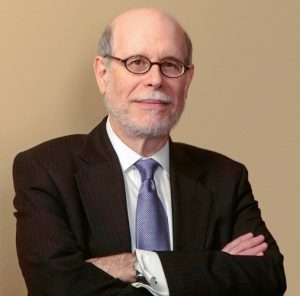 This second award to Lincoln scholar Harold Holzer was presented for three books published in 1993. The first, The Lincoln-Douglas Debates: The First Complete, Unexpurgated Text, provides the most reliable, unedited record available as well as background information on the debates. The second, Washington and Lincoln Portrayed: National Icons in Popular Prints, a profusely illustrated volume covering from 1775 to 1882, documents the "metamorphosis of Washington and Lincoln from products of our history to products of our imagination." And, finally, Dear Mr. Lincoln: Letters to the President, is a collection of letters written to Lincoln between his election and his assassination on a wide variety of subjects, each with a brief explanatory note.
This second award to Lincoln scholar Harold Holzer was presented for three books published in 1993. The first, The Lincoln-Douglas Debates: The First Complete, Unexpurgated Text, provides the most reliable, unedited record available as well as background information on the debates. The second, Washington and Lincoln Portrayed: National Icons in Popular Prints, a profusely illustrated volume covering from 1775 to 1882, documents the "metamorphosis of Washington and Lincoln from products of our history to products of our imagination." And, finally, Dear Mr. Lincoln: Letters to the President, is a collection of letters written to Lincoln between his election and his assassination on a wide variety of subjects, each with a brief explanatory note.
1992
Lincoln at Gettysburg: The Words That Remade America by Garry Wills
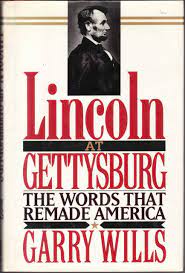 This thorough analysis of both the text and context of the Gettysburg Address provides insight not only into Lincoln’s message for his immediate audience but also into what it can mean to Americans today. Because that message, the book argues, was grounded in the Declaration of Independence’s basic premise that “all men are created equal,” it extended the meaning of the Civil War beyond the immediate conflict and gave Americans a different way to look at the country’s past as well as its future, in the process creating both a literary and a political masterpiece.
This thorough analysis of both the text and context of the Gettysburg Address provides insight not only into Lincoln’s message for his immediate audience but also into what it can mean to Americans today. Because that message, the book argues, was grounded in the Declaration of Independence’s basic premise that “all men are created equal,” it extended the meaning of the Civil War beyond the immediate conflict and gave Americans a different way to look at the country’s past as well as its future, in the process creating both a literary and a political masterpiece.
1991
The Fate of Liberty: Abraham Lincoln and Civil Liberties by Mark E. Neely, Jr.
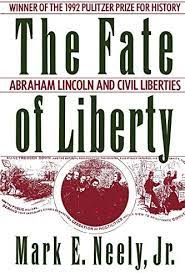 Abraham Lincoln’s record on the Constitution has been the subject of intense debate for more than a century. The Fate of Liberty is a comprehensive study of the issues of civil liberties during the Lincoln administration that puts them in the political context of their time. In the midst of a Civil War, Lincoln had to face an unprecedented number of constitutional problems, and drawing on letters from prisoners, records of military courts and federal prisons, memoirs, and other primary documents, the book provides a picture of how the administration dealt with these problems, how its policies were carried out, and the debate that grew out of their execution. The Fate of Liberty was also awarded the Pulitzer Prize in history.
Abraham Lincoln’s record on the Constitution has been the subject of intense debate for more than a century. The Fate of Liberty is a comprehensive study of the issues of civil liberties during the Lincoln administration that puts them in the political context of their time. In the midst of a Civil War, Lincoln had to face an unprecedented number of constitutional problems, and drawing on letters from prisoners, records of military courts and federal prisons, memoirs, and other primary documents, the book provides a picture of how the administration dealt with these problems, how its policies were carried out, and the debate that grew out of their execution. The Fate of Liberty was also awarded the Pulitzer Prize in history.
1990
The “Lincoln on Democracy” Project by Governor Mario M. Cuomo
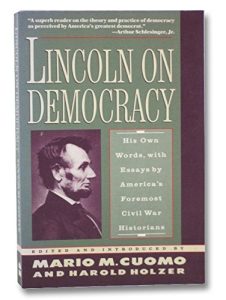 “Lincoln on Democracy” was created for the purpose of supporting the Solidarity Movement in Poland in its efforts to advance the causes of workers’ rights and social change. The key to the project was the publication of a book, Lincoln on Democracy: His Own Words, with Essays by America’s Foremost Civil War Historians, compiled by New York Governor Mario M. Cuomo and Harold Holzer. An anthology of Lincoln’s writings on liberty, freedom, equality, and self-determination, the book was translated into Polish, and thousands of copies were distributed to teachers in Poland for use in their classrooms.
“Lincoln on Democracy” was created for the purpose of supporting the Solidarity Movement in Poland in its efforts to advance the causes of workers’ rights and social change. The key to the project was the publication of a book, Lincoln on Democracy: His Own Words, with Essays by America’s Foremost Civil War Historians, compiled by New York Governor Mario M. Cuomo and Harold Holzer. An anthology of Lincoln’s writings on liberty, freedom, equality, and self-determination, the book was translated into Polish, and thousands of copies were distributed to teachers in Poland for use in their classrooms.
1989
Lincoln’s Speeches and Writings: Volume One: 1832 – 1858 and Volume Two: 1859 – 1865 edited by Don E. Fehrenbacher
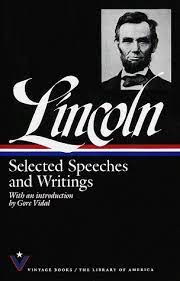 This two-volume set, part of the Library of America series, contains nearly 800 of Lincoln’s most significant works, including both sides of the Lincoln-Douglas debates, speeches, personal as well as political letters, military communications, presidential messages and proclamations, and other documents. Drawn from the authoritative Roy P. Basler’s The Collected Works of Abraham Lincoln, it includes both extensive notes on the texts and a detailed chronology of Lincoln’s life, making it the definitive collection for the general reader.
This two-volume set, part of the Library of America series, contains nearly 800 of Lincoln’s most significant works, including both sides of the Lincoln-Douglas debates, speeches, personal as well as political letters, military communications, presidential messages and proclamations, and other documents. Drawn from the authoritative Roy P. Basler’s The Collected Works of Abraham Lincoln, it includes both extensive notes on the texts and a detailed chronology of Lincoln’s life, making it the definitive collection for the general reader.
1988
Harold Holzer
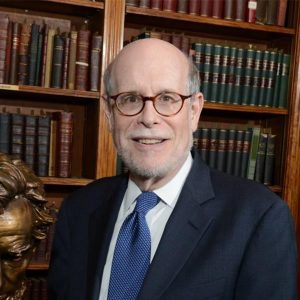 The first Lincoln Group of New York Award of Achievement was presented to Harold Holzer, a founder of the LGNY and one of America’s preeminent Lincoln scholars, for his many writings on Abraham Lincoln, including: “The Gettysburg Address” in American History Illustrated magazine; “A Few Appropriate Remarks” in Cobblestone, a history magazine for children; and the chapter “The Lincoln Image” in The Historian’s Lincoln: Pseudohistory, Psychohistory, and History edited by Gabor S. Boritt.
The first Lincoln Group of New York Award of Achievement was presented to Harold Holzer, a founder of the LGNY and one of America’s preeminent Lincoln scholars, for his many writings on Abraham Lincoln, including: “The Gettysburg Address” in American History Illustrated magazine; “A Few Appropriate Remarks” in Cobblestone, a history magazine for children; and the chapter “The Lincoln Image” in The Historian’s Lincoln: Pseudohistory, Psychohistory, and History edited by Gabor S. Boritt.
